Monitoring and Evaluation
Most M&E challenges, such as a lack of sufficient investment and capacities, are not specific to CVA. But those that are relate primarily to monitoring outcomes for unrestricted transfers. The flexibility of cash transfers can make it difficult to determine appropriate outcome indicators, as they may involve a combination of sector-specific and cross-cutting indicators. At the same time, there are limitations on gathering accurate data on how cash transfers are spent.
Grand Bargain signatories have committed to ensuring relevant M&E mechanisms are in place for cash, and increasing understanding of the costs, benefits, impacts and risks of cash relative to other modalities. Building on this, the GB cash workstream has action points including the development of common outcome indicators for multipurpose cash, and metrics for analysing value for money. Systematic value for money analysis has been limited by factors including a lack of agreed upon approaches, the need for quality outcome data, and the intensive nature of the analysis.
Current priorities
As part of the Grand Bargain cash commitments, the CALP Network has co-led (with USAID and CRS) the development of Multipurpose Cash Outcome Indicators. The draft for testing is currently available in English, French and Spanish via the library.
Related initiatives
Featured content

Multipurpose Cash Outcome Indicators – Final Draft for Testing
Guidelines and Tools
Note that the MPC indicators have now been revised. Please click here to access the updated Multipurpose Outcome Indicators and Guidance, which is available in Arabic, English, French and Spanish. Multipurpose Cash Outcome Indicators – Final Draft for Testing Multipurpose cash (MPC) is a type of assistance intended to enable people to meet their basic needs through local...

Monitoring 4 CTP: Monitoring Guidance for CTP in Emergencies
Guidelines and Tools
This guidance provides a central resource to promote a common understanding of the most important monitoring considerations for humanitarian projects using cash transfer programming (CTP). The primary audience for this guidance is field-level practitioners, from organisations directly involved in the design, implementation, monitoring, and accountability of projects using cash and vouchers...

Cost-Efficiency Analysis of Basic Needs Programs: Best Practice Guidance for Humanitarian Agencies
Guidelines and Tools
The Efficiency, Effectiveness and Value for Money Sub-Workstream is pleased to share the final output on Cost-Efficiency Analysis of Basic Needs Programs: Best Practice Guidance for Humanitarian Agencies (attached).
Cost-efficiency analysis estimates the ratio of program costs to outputs created, allowing you to compare cost-per-output for programs which all produced the same output. Such...
Thematic lead
Latest

Shock-Responsive Social Protection Systems Research Case Study: Pakistan
Report
This case study presents an overview of the social protection disaster risk management and humanitarian systems in Pakistan, and discusses both Pakistan’s flagship social protection programme, the Benazir Income Support Programme (BISP), as well as emergency cash transfers provided as disaster...

Monitoring for MPGs: Ethiopia
Guidelines and Tools
DRC partnered with graduate students from the Fletcher School at Tufts University, to design three quantitative and qualitative monitoring tools to gauge the effect of MPGs at household and community levels (namely household survey, key informant interview and community group discussion templates). This...
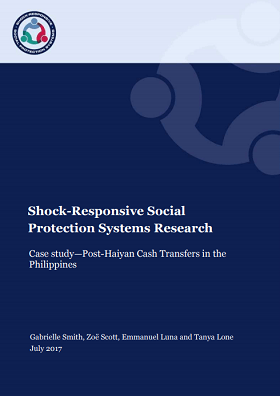
Shock-Responsive Social Protection Systems Research Case study—Post-Haiyan Cash Transfers in the Philippines
Report
This case study report focuses specifically on the experiences of using emergency cash transfers following Typhoon Haiyan and considers the wider social protection system, developments since Haiyan and future possibilities for shock-responsive social protection. A summary briefing note is published...

A Review of Inter-Agency Collaboration for CTP Delivery
Report
Recent global initiatives have reaffirmed the potential for Cash-Transfer Programmes (CTP) to effectively and efficiently meet a wide range of disaster-affected populations’ needs while preserving dignity and choice. Although much work has been done in advocating for the benefits of CTP and enhancing...

The Livelihood Impacts of Cash Transfers in Sub-Saharan Africa: Beneficiary Perspectives from Six Countries
Report
Cash transfers (CTs) are a social protection mechanism to reduce the poorest households’ vulnerability to shocks and build human
capital by smoothing consumption and sustaining expenditure on education and social welfare.
This study examines whether and how CTs go beyond welfare objectives to promote...

Building on social protection systems for effective disaster response: the Pakistan experience
Report
How can social protection systems be used in disasters, as a complement to, or substitute for, humanitarian assistance? Oxford Policy Management (OPM) led a two-year research project investigating this question, looking at the role of social protection in both mitigating the impact of large-scale shocks...

A promise of tomorrow.The effects of UNHCR and UNICEF cash assistance on Syrian refugees in Jordan
Report
Despite the generous hosting by the Government and people of Jordan of Syrian refugees, more than 650,000 registered Syrian refugees in the country, continue to face a highly uncertain future. They cannot go home, given the ongoing conflict and insecurity in Syria; many of the most vulnerable struggle to...
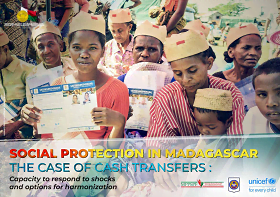
Social protection in Madagascar – The Case of Cash Transfers: Capacity to respond to shocks and options for harmonization
Report
The report has been prepared as commissioned by the Government of Madagascar (Ministry of Population, Social protection and Women’s Promotion and the National Office of Risk and Disaster Management) in coordination with the members of the emergency cash group and with UNICEF’s funding and technical...

The Role of Financial Services in Humanitarian Crises
Guidelines and Tools
More than 75 percent of adults who live in countries that are coping with humanitarian crises remain outside the formal financial system. Financial inclusion would provide both refugees and residents with a diversified set of financial products (including savings, remittances, credit, and insurance) that...

Partnering with Mobile Network Operators in Zimbabwe to Deliver Cash Transfers
Report
This case study seeks to investigate and document the following: The process of engagement between MNOs and CARE. Clarity of roles between CARE/WVI as implementing agencies and MNOs. Successes and challenges in the partnership between CARE/WVI and the MNOs Measures taken to manage the impact of the...

Real time evaluation report for Kenya Red Cross Society
Report
After launching of its first Drought Emergency Appeal, Kenya Red Cross Society undertook a real time evaluation of its cash transfer response in May 2017 to find out what was working or not working in the KRCS emergency cash transfer response to enable decision making in the remaining period of the...
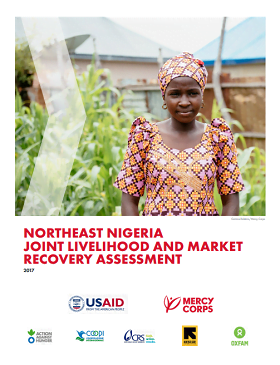
Northeast Nigeria joint livelihoods and market recovery assessment
Report
Mercy Corps Nigeria, in conjunction with Action Against Hunger, Cooperazione Internazionale, Catholic Relief Services, the International Rescue Committee and Oxfam undertook the assessment across the three most affected states in Northeast Nigeria; Adamawa, Borno and Yobe, to better understand...

Responding to Drought in Kenya Using Cash and Vouchers: Learning from Previous Responses
Report
This paper provides a summary of 100 recommendations, lessons and observations from evaluations that have looked at the use of cash and vouchers in drought responses in Kenya. The reports which were reviewed considered the use of cash and vouchers in drought related responses in urban and rural areas;...
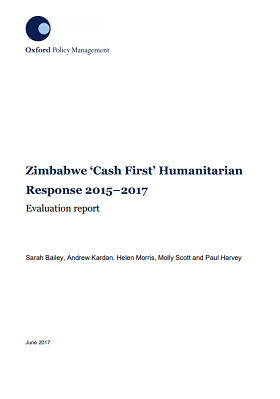
Zimbabwe ‘Cash First’ Humanitarian Response 2015–2017: Evaluation Report
Report
CARE International and World Vision International (WVI) in Zimbabwe implemented the UK Department for International Development (DFID)-funded project ‘Emergency Cash First Response to Drought-Affected Communities in the Southern Provinces of Zimbabwe’ from August 2015 to April 2017. The project...

Lessons from Northern Uganda in addressing gender based violence
Report
This case study summarises Action Against Hunger work in North Uganda. ACF aims to empower women in Northern Uganda using a two pronged strategy; a) cash transfers, skills training and VSLAs for income generating activities, and b) interventions to prevent violence against women at the household...
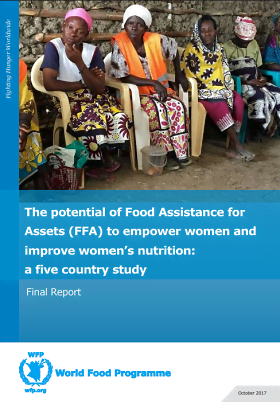
The Potential of Food Assistance for Assets (FFA) to Empower Women and Improve Women’s Nutrition: a five country study
Report
From June 2016 to April 2017, a five-country study to explore the potential of WFP’s Food Assistance for Assets (FFA) programmes to empower women and improve women’s nutrition was conducted by WFP. The purpose of the study was to: 1. Assess changes (outcomes or impacts) that relate to women’s...

Collecting Prices for Food Security Programming
Guidelines and Tools
As a contribution towards standardizing price data collection, this paper aims to explore the core issues related to setting up a price monitoring system, also in countries where no such system currently exists. It describes the factors a country office needs to consider when designing such a system,...

Managing Cash-Based Programmes in a Volatile Markets Contexts: The Case of Delivering Cash Using Mobile Money During the Zimbabwe Cash Liquidity Crisis
Report
This case study examines how the Zimbabwe national cash crisis evolved and the ways in which affected communities and the CTP adapted to the challenges it posed. The study highlights what worked well, what was less effective, and some other possible future opportunities. It also provides operational...
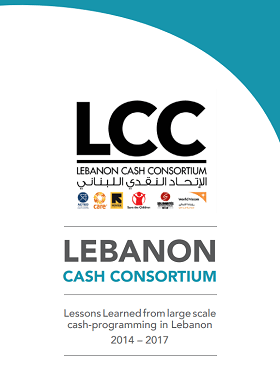
Lessons Learned from large scale cash programming in Lebanon 2014 – 2017
Report
Given the fact that cash is becoming an increasingly used modality in humanitarian
interventions, coupled with the evolution of the funding model for cash assistance in Lebanon, the former LCC agencies find it important to give to cash consortia and cash actors the benefit of the unique experience that...

The use of CTP in Kenya: Reflecting on the 2016/17 Drought Response
Report
This workshop report is packed with useful ideas and information, reflecting the lively discussions which took place at a workshop in June 2017 about the use of CTP in the Kenya drought response. Discussions touched on multiple issues including coordination; cash transfer values; lack of awareness...
